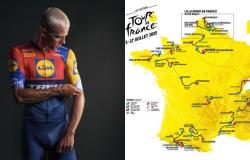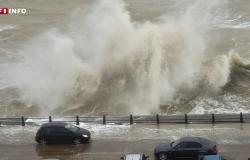
the essential
In his book “All Passed Without Fear”, published on January 2 by POL editions, the writer Jean Rolin goes in search of the “escapers from France”, who took the arduous passes of the Pyrenees to escape Nazi persecution. The adventurous writer thus stopped in Ariège, Saint-Girons or even Foix, following the ghosts of the aviator Bud Owens or the brothers Jacques and Jean-Pierre Grumbach, the latter later known under the name of Jean -Pierre Melville, on the path to freedom. Between the story of his ascent of these passes in their footsteps of the escapees and the historiographical research carried out between the hushed shelves of the archives, a beautiful tribute to these “forgotten by History” unfolds.
Why this book about the people who crossed the passes of the Pyrenees to escape the Nazis, whom you describe as “forgotten by History”?
“I was born in 1949, I am 75 years old, almost 76. The Second World War, I was born into it. I am part of a generation which was extremely steeped in that, we grew up in cities stigmatized by the bombings I spent most of my childhood in Dinard, near Saint-Malo which had suffered at that time, and I saw all that, the ruins, the blockhouses: that makes a child wonder, It stays in the back of your mind.”
Was there a particular trigger that made you embark on this climb of the Pyrenees at that age?
“I think I’ve had this desire to write on this subject for a long time. I’ve been interested in Jean-Pierre Melville for a while, who is a filmmaker I know well. I watched a documentary about him in the archives of the National Audiovisual Institute, where he describes the artillery preparation preceding the crossing of Garigliano (Italy), before the assault on the Gustave line (fortified line built by the Nazis in Italy , Editor’s note), and there, listening to Melville, it reminded me of a discussion with my father. Although he absolutely never spoke to me about the war, one evening, we had been drinking together and he spoke to me about it, in a very visual way. , cinematic, as Melville himself described it.
I also knew the story of Walter Benjamin (German philosopher and critic who crossed the Pyrenees to Banyuls [Pyrénées-Orientales] before killing himself on September 26, 1940 in Portbou [Espagne] a few days after his arrival, Editor’s note), of my uncle too, an unfortunate man who deserted the French Volunteer Legion against Bolshevism (who fought under the German uniform, Editor’s note), before crossing the Pyrenees, apparently all alone, from to go to North Africa and join the paratroopers, where he broke his leg on his third jump.
The final element, I think it was a book by Gérard Guéguan entitled “Fraenkel, un éclair dans la nuit” (on Théodore Fraenkel, French writer and doctor who made the crossing through the port of Fontargente, in Aston, Editor’s note) , which is at the origin of my interest in these crossings in the context of the Occupation.”
How did your climbs of the different passes go?
“It’s possible, it’s hiking, even though I’m asthmatic and a heavy smoker, I still walk regularly. But there’s such a difference in altitude, I no longer have the breath to do that. I gave of my person, especially for the port del Rat There is also the Freedom March in Saint-Girons that I tried to do, even if I knew that I would not go to the end, but I was. absolutely appalled by the rhythm In the end, I triumphed over the difficulties but I struggled (laughs). But it was a wonderful experience, especially since I always found the Pyrenees, where I was able to report, absolutely. splendid I also preferred to be careful: usually, I prefer to walk alone, but here, given the technical difficulties, I was accompanied, particularly in Saint-Girons, by an extremely friendly person, Francis Tabouret.”
-
ML DDM
There also seems to have been a significant amount of historiographical research.
“I actually alternated between walking and research, which I carried out in particular at the Defense Historical Service in Vincennes and at the Departmental Archives of Ariège. I also really enjoyed the time I had spent there, in Foix, and I would like to say a big thank you to the archives teams. I also do my research in books that I obtain like everyone else. sum on these crossings of Pyrenees during the Occupation, it is “At the borders of freedom, by the historian Robert Belot” (1998, ed. Fayard).”
Was there a time when you felt overwhelmed by the task, especially during hikes?
“On the Walter-Benjamin path, I considered cheating. The day before, I did a reconnaissance where I saw that there was a way to avoid about 2/3 of the difference in altitude. But, I write it in a somewhat grandiloquent way in the book, I said that it was a bit of a betrayal of the people who had done it, especially since they had death on their heels, which was not not my case, and that all I risked was to collapse exhausted on a rock. I write it in a somewhat pompous manner, but my own difficulties as a walker obviously seemed ridiculous to me compared to those of these unfortunate people.
Does this memory of the smugglers of the Second World War still exist where you went?
“No, I don’t think so, except on Chemin Benjamin with all its tags, or in Saint-Girons. There, I was with people who created a museum on this subject, who created this march which explicit that we are on the path to freedom There are also the ceremonies with the taking of arms, the laying of wreaths, there we are in the middle of History The hikers are also warned, it is punctuated with memorial reminders. .”





